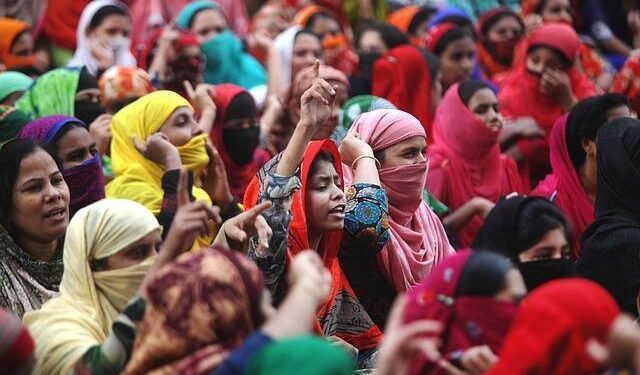Nigeria’s Rising Protests: Citizens Rally Against Soaring Living Expenses and Economic Struggles
In recent weeks, Nigeria has experienced a notable increase in public demonstrations as citizens unite under the slogan “Enough is Enough,” voicing their growing frustration over an intensifying cost-of-living crisis. With inflation climbing to over 22% in early 2024, food prices reaching unprecedented highs, and the naira continuing to lose value against global currencies, Nigerians across major urban centers have taken to the streets demanding swift government intervention. These protests not only underscore immediate financial hardships but also shed light on deeper systemic issues related to governance and economic management in a country abundant in natural resources yet grappling with persistent structural challenges.
Escalating Economic Pressures Spark Nationwide Calls for Government Accountability
The tightening economic conditions have pushed many Nigerians into precarious living situations. Essential goods such as rice, beans, and cooking oil have seen price increases exceeding 40% compared to last year, while transportation fares have surged due to rising fuel costs following subsidy removals. Many households now face difficult decisions between purchasing food or paying for healthcare and education.
Protesters are unified around several core demands aimed at alleviating these pressures:
- Immediate stabilization of essential commodity prices through effective policy measures.
- Adequate wage adjustments that reflect current inflationary realities impacting workers nationwide.
- Expansion of social safety nets, including targeted support programs for vulnerable groups such as low-income families and informal sector workers.
The organizers emphasize that years of neglect have left many feeling marginalized by political leaders who appear disconnected from everyday struggles. They call for solidarity among citizens to amplify their voices and ensure their grievances cannot be dismissed amid ongoing political discourse. The mounting pressure places Nigerian authorities at a crossroads regarding how they will address this growing unrest.
Diving Deeper: Key Drivers Behind Nigeria’s Cost-of-Living Crisis
The roots of Nigeria’s current economic turmoil are multifaceted. Chief among them is rampant inflation fueled by volatile global oil markets—Nigeria’s primary export—and increased import tariffs that raise costs on foreign goods vital for daily consumption. Supply chain bottlenecks exacerbated by lingering effects of the COVID-19 pandemic continue disrupting availability of products nationwide.
The persistent depreciation of the naira—losing nearly 30% against the US dollar since mid-2023—has further inflated prices on imported items ranging from pharmaceuticals to electronics. Additionally, government decisions such as removing longstanding fuel subsidies intended to reallocate funds toward infrastructure development inadvertently triggered sharp hikes in transportation expenses affecting all sectors.
Beyond macroeconomic factors, structural weaknesses like inadequate power supply hinder industrial productivity; unemployment rates remain stubbornly high at approximately 33%, disproportionately affecting youth; meanwhile limited access to affordable credit stifles small business growth crucial for job creation. These intertwined challenges contribute significantly toward widespread hardship felt across Nigerian society today.
Tackling Economic Hardship: Policy Recommendations for Sustainable Relief
The surge in civic activism highlights an urgent need for comprehensive governmental strategies designed both for immediate relief and long-term resilience building within Nigeria’s economy:
- Reinstating targeted subsidies or price controls on staple foods and fuel: This can provide short-term respite from soaring costs while safeguarding vulnerable populations’ access to essentials without distorting market dynamics excessively.
- Enhancing social protection schemes: Expanding cash transfer programs modeled after successful initiatives like Brazil’s Bolsa Família could help cushion low-income families during periods of economic volatility.
- Pursuing robust job creation efforts: Prioritizing investment incentives within emerging sectors such as renewable energy technologies or agro-processing industries can stimulate employment opportunities.
- Strengthening vocational training programs: Collaborations with private sector partners can equip young Nigerians with skills aligned with market demands — similar approaches implemented recently in Kenya’s tech hubs show promising results.
- Cultivating transparent partnerships with civil society organizations: Ensuring aid distribution reaches intended beneficiaries efficiently builds trust between communities and policymakers alike.
A Turning Point: What Lies Ahead For Nigeria?
The collective voice echoing through protests signals a pivotal moment where ordinary Nigerians demand not just temporary fixes but meaningful reforms addressing entrenched inequalities fueling their hardships. While government responses remain closely watched domestically and internationally—with some officials pledging new stimulus packages—the path forward requires balancing fiscal responsibility alongside urgent humanitarian needs.
This groundswell reflects more than just dissatisfaction over economics; it embodies aspirations toward accountable leadership capable of harnessing Nigeria’s vast potential into inclusive prosperity rather than continued struggle. As this chapter unfolds amidst global attention focused on Africa’s most populous nation, one certainty remains clear: Nigerian citizens are resolute in pursuing dignity through equitable solutions that honor their rights today—and secure hope tomorrow.















How Trump’s Tariffs Transformed a Mexican Businessman into a Grateful Ally